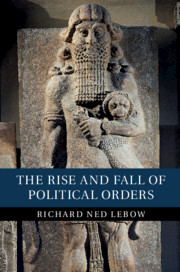Book contents
- The Rise and Fall of Political Orders
- The Rise and Fall of Political Orders
- Copyright page
- Dedication
- Contents
- Figures
- Acknowledgments
- Introduction
- 1 Political Order
- 2 Justice, Solidarity, and Order
- 3 Why Do Orders Form?
- 4 Why Do Orders Break Down?
- 5 The United States: Self-Interest
- 6 The United States: Fairness vs. Equality
- 7 Georgian Britain
- 8 China
- 9 Order Revisited
- 10 The Crises of Modernity
- Bibliography
- Index
- References
Bibliography
Published online by Cambridge University Press: 24 August 2018
- The Rise and Fall of Political Orders
- The Rise and Fall of Political Orders
- Copyright page
- Dedication
- Contents
- Figures
- Acknowledgments
- Introduction
- 1 Political Order
- 2 Justice, Solidarity, and Order
- 3 Why Do Orders Form?
- 4 Why Do Orders Break Down?
- 5 The United States: Self-Interest
- 6 The United States: Fairness vs. Equality
- 7 Georgian Britain
- 8 China
- 9 Order Revisited
- 10 The Crises of Modernity
- Bibliography
- Index
- References
- Type
- Chapter
- Information
- The Rise and Fall of Political Orders , pp. 357 - 424Publisher: Cambridge University PressPrint publication year: 2018



